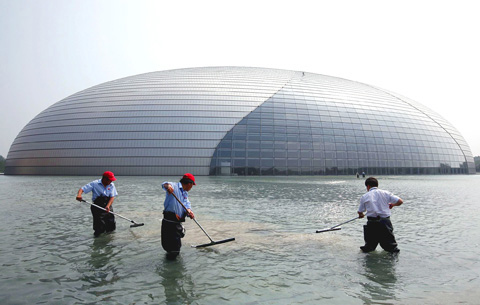The Chinese economic juggernaut slowed but still maintained double-digit growth in the first half of the year as it battled inflation and absorbed global setbacks, official data showed yesterday.
The world’s fourth-biggest economy expanded by 10.4 percent in the first half and 10.1 percent in the second quarter, the National Bureau of Statistics (NSB) said, down from the sizzling pace of 11.9 percent recorded for all of last year.
Bureau spokesman Li Xiaochao (李曉超) said domestic inflation, problems with food supplies and global economic woes were among the chief concerns for China.

PHOTO: EPA
“Pressure for rapid price increases remains high, there are factors constraining steady agricultural production,” Li said. “The international financial situation is severe and there are uncertainties in world economic development.”
Nevertheless, he said China’s economy remained strong and that the slowdown was under control.
“The national economy maintains the momentum of steady and fast growth,” he said. “This slowdown is in line with our expectations.”
NBS chief economist Yao Jingyuan (姚景源) said the economy would likely grow at 10 percent for the full year, although this was still above the target set by Premier Wen Jiabao (溫家寶) of 8 percent.
China’s consumer price index — the main gauge of inflation — rose 7.9 percent in the first half of the year, with food prices soaring 20.4 percent, the bureau said.
However, inflation has come off 12-year highs seen earlier in the year, when it peaked at 8.7 percent in February, with economists saying the fall was due to a raft of economic tightening measures, including interest rate hikes.
Inflation was 7.1 percent last month, the bureau said.
Nevertheless, there were few expectations inflation would fall steeply enough to achieve the government’s full-year target of 4.8 percent.
“Certainly, the expectation for inflation is fairly strong ... due to price rises on the international market,” Li said.
China had already released data last week showing the nation’s trade surplus had fallen nearly 12 percent in the first half, as exporters struggled with the global economic slowdown, particularly problems in the US.
The appreciation of the yuan against the US dollar, as well as curbs such as tariffs on exports imposed by the government to rein in the surplus, also contributed to the decline.
Economists said Sichuan earthquake in May, which left 88,000 dead or missing, did not have a big impact on the economic growth numbers in the second quarter.
However, a huge post-quake reconstruction effort could lift the growth numbers in the short term, said Sherman Chan (陳穎嘉), an expert with Moody’s Economy.com.
“Rapid and large-scale reconstruction works in the next couple of years will provide a boost to economic activity,” he said.
Industrial output expanded by 16.3 percent in the first half and 16.0 percent last month alone, the bureau said.

AIR SUPPORT: The Ministry of National Defense thanked the US for the delivery, adding that it was an indicator of the White House’s commitment to the Taiwan Relations Act Deputy Minister of National Defense Po Horng-huei (柏鴻輝) and Representative to the US Alexander Yui on Friday attended a delivery ceremony for the first of Taiwan’s long-awaited 66 F-16C/D Block 70 jets at a Lockheed Martin Corp factory in Greenville, South Carolina. “We are so proud to be the global home of the F-16 and to support Taiwan’s air defense capabilities,” US Representative William Timmons wrote on X, alongside a photograph of Taiwanese and US officials at the event. The F-16C/D Block 70 jets Taiwan ordered have the same capabilities as aircraft that had been upgraded to F-16Vs. The batch of Lockheed Martin

GRIDLOCK: The National Fire Agency’s Special Search and Rescue team is on standby to travel to the countries to help out with the rescue effort A powerful earthquake rocked Myanmar and neighboring Thailand yesterday, killing at least three people in Bangkok and burying dozens when a high-rise building under construction collapsed. Footage shared on social media from Myanmar’s second-largest city showed widespread destruction, raising fears that many were trapped under the rubble or killed. The magnitude 7.7 earthquake, with an epicenter near Mandalay in Myanmar, struck at midday and was followed by a strong magnitude 6.4 aftershock. The extent of death, injury and destruction — especially in Myanmar, which is embroiled in a civil war and where information is tightly controlled at the best of times —

China's military today said it began joint army, navy and rocket force exercises around Taiwan to "serve as a stern warning and powerful deterrent against Taiwanese independence," calling President William Lai (賴清德) a "parasite." The exercises come after Lai called Beijing a "foreign hostile force" last month. More than 10 Chinese military ships approached close to Taiwan's 24 nautical mile (44.4km) contiguous zone this morning and Taiwan sent its own warships to respond, two senior Taiwanese officials said. Taiwan has not yet detected any live fire by the Chinese military so far, one of the officials said. The drills took place after US Secretary

THUGGISH BEHAVIOR: Encouraging people to report independence supporters is another intimidation tactic that threatens cross-strait peace, the state department said China setting up an online system for reporting “Taiwanese independence” advocates is an “irresponsible and reprehensible” act, a US government spokesperson said on Friday. “China’s call for private individuals to report on alleged ‘persecution or suppression’ by supposed ‘Taiwan independence henchmen and accomplices’ is irresponsible and reprehensible,” an unnamed US Department of State spokesperson told the Central News Agency in an e-mail. The move is part of Beijing’s “intimidation campaign” against Taiwan and its supporters, and is “threatening free speech around the world, destabilizing the Indo-Pacific region, and deliberately eroding the cross-strait status quo,” the spokesperson said. The Chinese Communist Party’s “threats